Bed bug bites usually appear as small red welts in lines. Learn more about bed bug bites and how to tell if you've been bitten.

Why do bed bugs bite?
Contributed by: Pat Hottel
Updated on: August 23, 2022
Bed bugs are a notoriously sneaky nuisance. An infestation can happen to anyone and it may take days before you even realize these pests have set up camp in your home.
Bed bugs feed on the blood of humans and other mammals in order to grow and thrive. Bed bugs use a variety of biological signals, including body heat and carbon dioxide emitted from warm-blooded sources, to identify a host.
Because they are nocturnal, bed bugs feed at night, while most people are asleep. Their blood meal lasts about 10 minutes. They then go back into hiding, where they stay until they need another meal.
Bed bug bite symptoms
A bed bug bite can often leave you itchy, sleepless and uncomfortable. However, it's easy to confuse bed bug bites with bites from other insects. Here is a list of bed bug bite symptoms to help you more easily identify the true culprit and cause of your discomfort:
- Red, itchy welts. According to the American Academy of Dermatology Association (AAD), bed bug bites result in flat, red welts in zigzag lines or small clusters on your skin. While bugs do not spread disease-causing pathogens, their bites can be itchy and irritating. If you scratch them too much, the welts could bleed or result in a secondary infection due to broken skin.
- Bites on exposed skin. Bed bugs tend to feed on exposed skin. For example, many people sleep with arms and shoulders outside of the blankets. This practice can make your extremities a prime target for bed bugs in search of easy access to a blood meal.
- Allergic reactions. Some people may react more severely to bed bug bites than others. According to the CDC, those who are allergic to bed bug bites could experience enlarged red welts, painful swelling around bite areas and even anaphylaxis – a severe allergic reaction that could cause a person to go into shock.
Not everyone experiences these symptoms of bed bug bites. In fact, some people have no reaction at all. Learn more about general signs of bed bugs.
When do bed bug bites first appear?
According to the Centers for Disease Control, it can take up to 14 days for a bite reaction to appear. Some people may not notice bites at all, while others may see signs of a bite within hours.
Are bed bug bites always visible?
At first, bed bug bites can be completely painless and it could take days to develop any reaction on the skin. According to the CDC, some people will have no physical reaction at all to bed bug bites. If no marks develop on the skin but you still suspect you may have an infestation, the tiny blood stains the bugs leave behind on the bed after feeding could be the only sign you've been bitten. Be sure to take steps to check your room and bedding thoroughly.
What do bed bug bites look like?
When bites do show, they will most likely appear as small red welts in zigzag lines or small clusters. Bed bug bites are sometimes mistaken for mosquito or flea bites. While all three insects can cause small red bumps or welts in those they've bitten, bites from a bed bug are usually distinguished by their clustered or zigzag pattern, according to the American Academy of Dermatology.
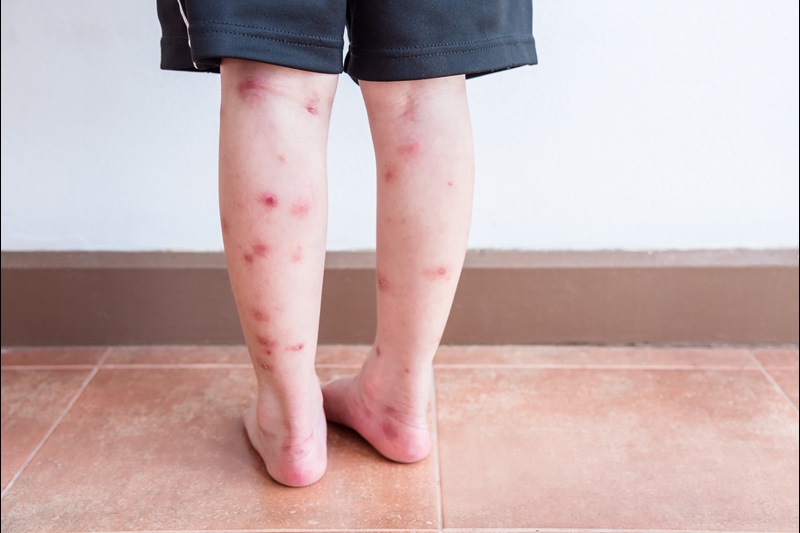
While flea bites typically appear on the feet, ankles and lower parts of the legs, bed bug bites can appear on any part of your exposed body. Similarly, mosquito bites may appear on exposed skin, usually after spending time outdoors in hot, muggy weather. However, bites from each of these pests may cause localized itching that, in some cases, can be severe. Over time, people may become increasingly sensitive to bed bug bites, so the red welts and itching can grow in intensity the more often you are bitten.
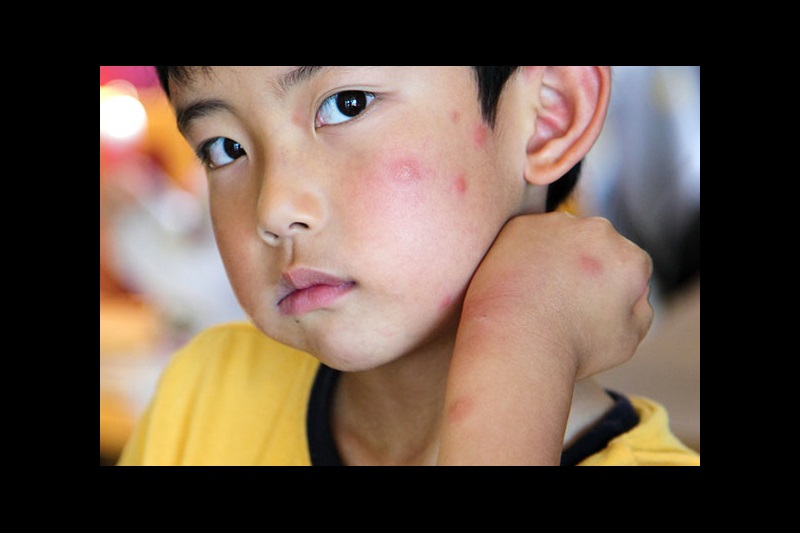
How long do bed bug bites last?
Most bites will heal within one to two weeks of appearing and not cause any long-term problems. Those with stronger sensitivities to insect bites may take up to three weeks or longer to heal.
Do bed bug bites hurt?
At first, you probably won't feel anything. As noted by the CDC, when a bed bug bites, it injects an anesthetic and an anticoagulant into your bloodstream. As a result, you may not realize you've been bitten until the telltale red welts appear hours or days afterward. When that happens, bed bug bites can become itchy and irritating. If you scratch at these bites, they may become even itchier and more irritating. Excessive scratching can create skin problems, bleeding, or a secondary infection.
Bed bug bites affect everyone differently. Some people may experience more severe symptoms, including allergic reactions, while others may have no reaction at all.
Do bed bugs bite only at night?
Bed bugs are nocturnal, which means they are active mainly at night. They normally bite people who are sleeping or sitting still for long periods of time. However, bed bugs will not bite every night. They only come out when they need to eat, and it could be several nights or several weeks before they need another meal.
Because their appearances can often be irregular, it may take a while to realize that you have a bed bug infestation. The longer a bed bug infestation goes untreated, the more time these pests have to reproduce – and they do reproduce quickly. If you suspect that you may have an infestation, it's important to seek out treatment for bed bugs as soon as possible.
How to tell bed bug bites from skin conditions or other insect bites Bed bugs, mosquitoes, fleas and spiders: they all bite and leave their mark, so how can you tell which creature has bitten you? Keep reading to learn more about the differences between bed bug bites and other insect bites, as well as skin conditions that look similar to bed bug bites.
Bed bug bites vs. hives
Hives are itchy, raised bumps on the skin that can be the result of an allergic reaction to foods, exposure to extreme weather conditions, medications or even insect bites. Hives look similar to bed bug bites in that they are small, itchy red bumps. The key difference is in the way these bumps change over time. Hives tend to migrate to other parts of the body or go away within 24 hours. The red bumps from hives also have a tendency to change shape and grow larger in a short period of time. Bed bug bites will eventually heal, but they don't migrate and change shape the way hives do. Rather, bed bug bites will stay localized to the area where a bed bug initially bit.
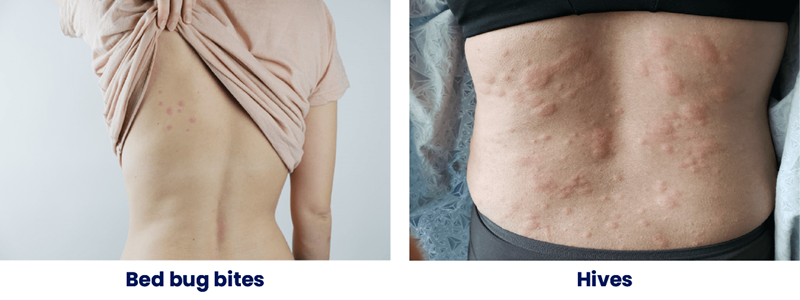
Bed bug bites vs. fleas
Both bed bugs and fleas feast on animal and human blood, and both leave similar itchy, red spots on your body. One key difference can be seen in the location of the bites. Fleas tend to bite on the lower part of your body, such as ankles and feet. By contrast, bed bugs target skin that is exposed while sleeping, which often includes the arms, shoulders, legs and face.
Fleas can carry disease-causing pathogens, including flea-borne typhus and cat scratch disease. Bed bugs do not spread disease-causing pathogens. However, intense scratching can break the skin and cause bleeding, which may lead to a secondary infection. Importantly, one of the best ways to identify what bug bite you're dealing with is to find the bug itself.
Bed bug bites vs. mosquito bites
Both bed bug and mosquito bites leave itchy, red welts on your skin. Similarly, both tend to heal on their own in one to two weeks. The main difference between bed bug bites and mosquito bites can be seen in the configuration of the bites. If the bites are in a cluster or a zig zag pattern, they are most likely from bed bugs. If the bite marks aren't in any recognizable pattern and appear on random parts of the body, then they are more likely the result of a mosquito. Additionally, the center of a mosquito bite can feel hard to the touch. Again, one of the best ways to identify what bug bite you're dealing with is to find the bug itself.
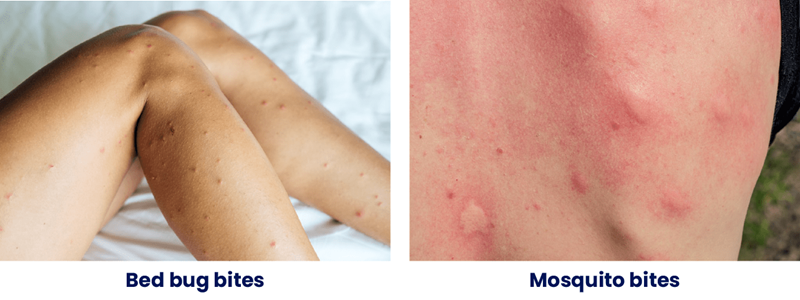
Mosquitoes bite to extract blood and use it to develop their eggs. A mosquito can transmit several disease-causing pathogens, such as West Nile virus and malaria. In some instances, some people may have a severe reaction to a mosquito bite, experiencing low-grade fever and even swollen lymph nodes.
When trying to figure out which pest may have bitten you, you can also take note how long it takes to react to the bite. A mosquito bite will swell almost instantly, while a bed bug bite may take a few hours or even days to appear.
Bed bug bites vs. scabies bites
Bed bugs and scabies both feed on your blood, but they are different types of creatures that leave their marks in different ways. Bed bugs are small, but not invisible, and bite exposed skin. Scabies are microscopic mites that burrow under your skin to feed on your blood and lay their eggs.
The difference in the bites is that scabies don't actually bite. They burrow. When the skin first reacts to the scabies, it can develop red, itchy welts that may look a lot like bed bug bites. Over time, the welts caused by scabies appear more scaly and leave slight, raised trails in your skin. A rash caused by scabies can feel more intensely itchy at night, which can mislead people to believe they are bed bug bites. Scabies should be diagnosed and treated by a physician.
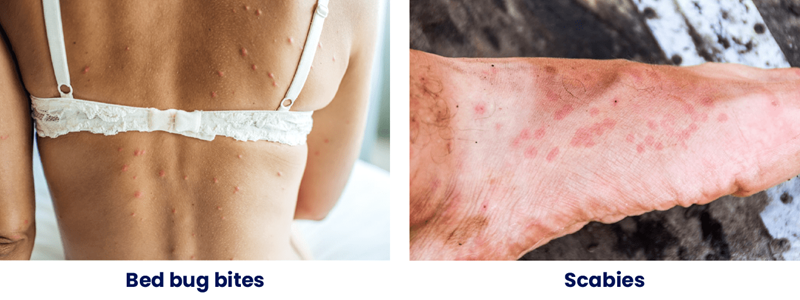
Bed bug bites vs. spider bites
A spider bite is often red and itchy, just like a bed bug bite. However, spiders usually only bite once. If you only have one bite, then it is more likely to be a spider bite than a bed bug bite. Depending on the spider that inflicted the bite, a spider bite can be more severe than bed bug bites and take longer to heal. Some spiders are venomous and their bite may require medical attention.
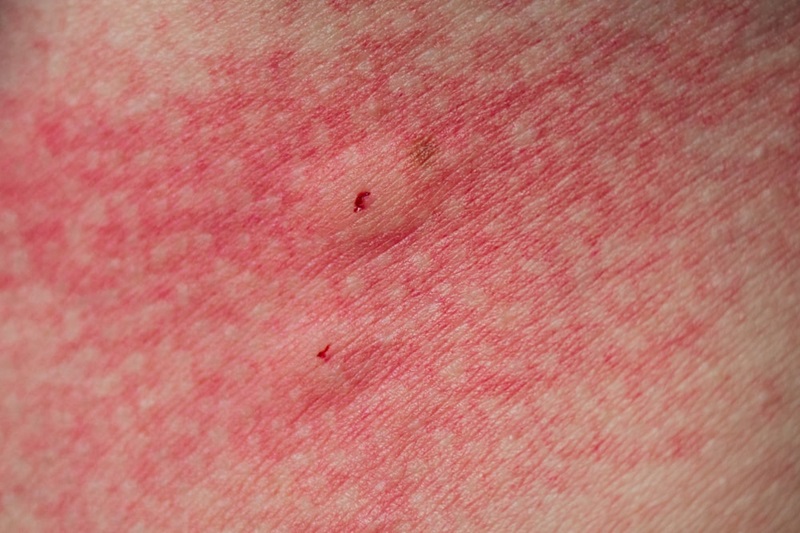
Learn how Terminix can help with bed bugs
Have you ever said, "Good night, sleep tight, don't let the bed bugs bite"? This cute little bedtime poem has plenty of uncomfortable truth behind it. Bed bugs can infest your bed and leave itchy bites on your skin. Once they've taken root in your home, it can be difficult to get rid of bed bugs because they multiply quickly.
Fortunately, Terminix can help. If you believe you have a bed bug infestation, contact us immediately. We'll dispatch a bed bug control specialist who will conduct an inspection and recommend a personalized treatment plan to help rid your home of these irritating little pests.


